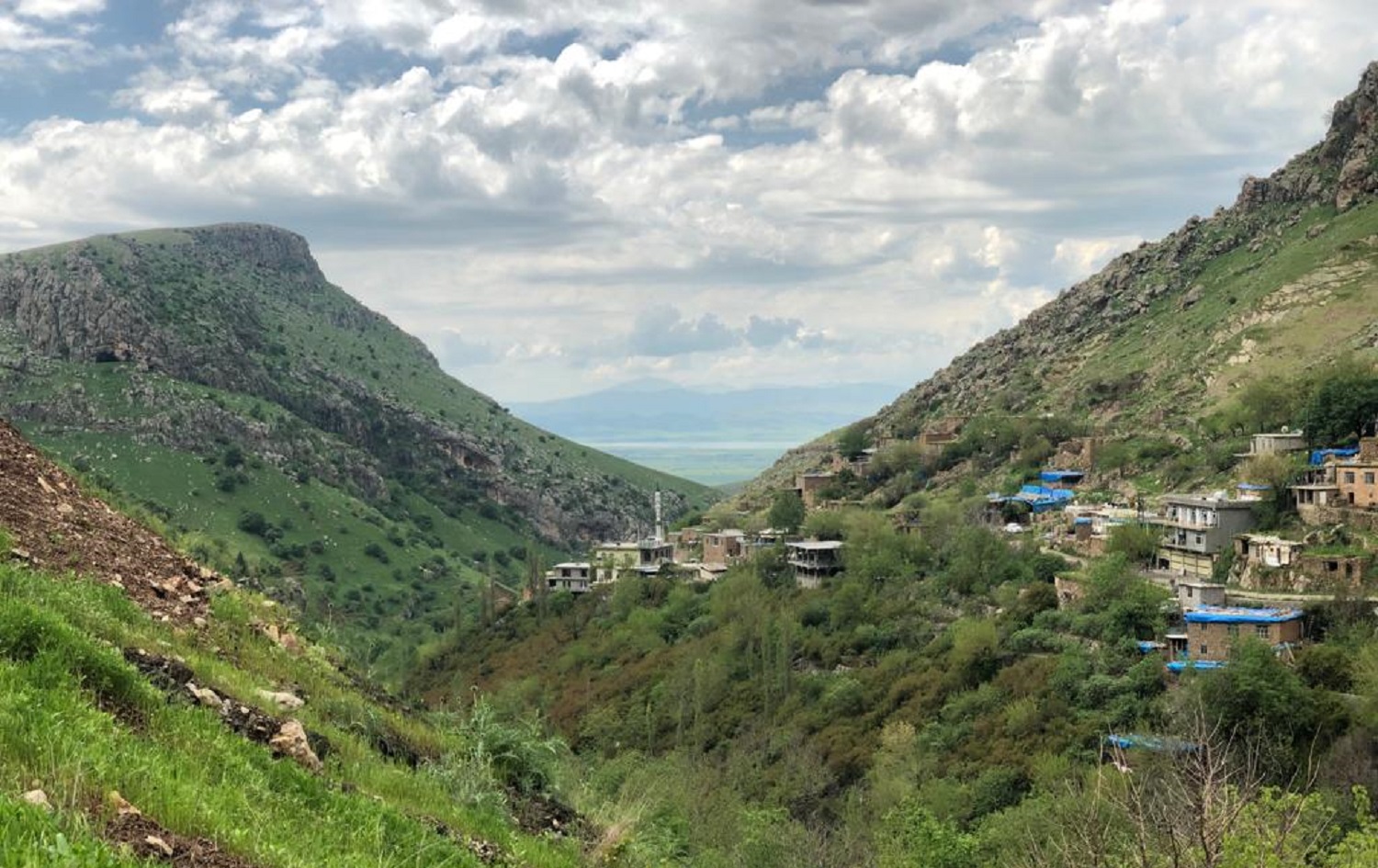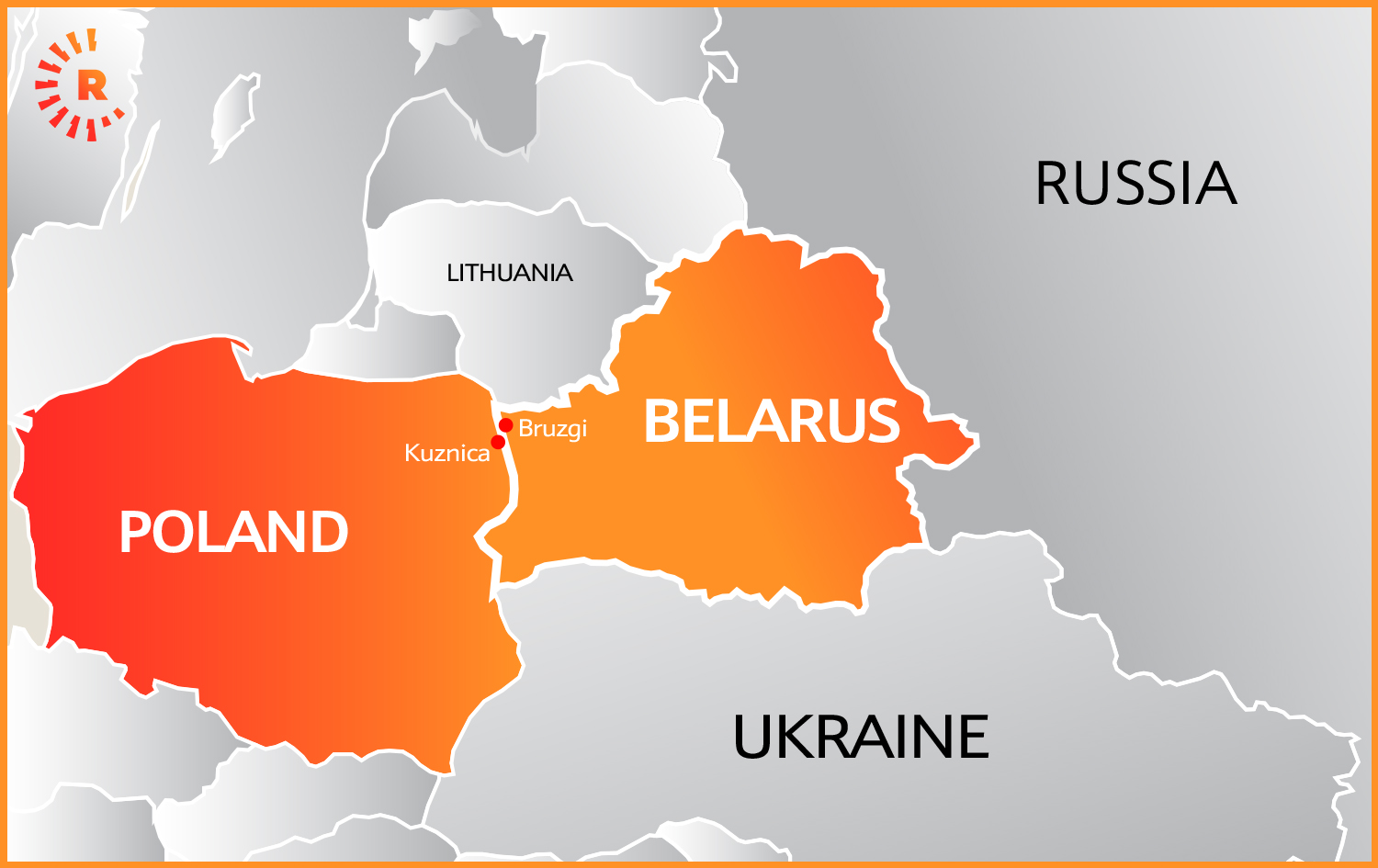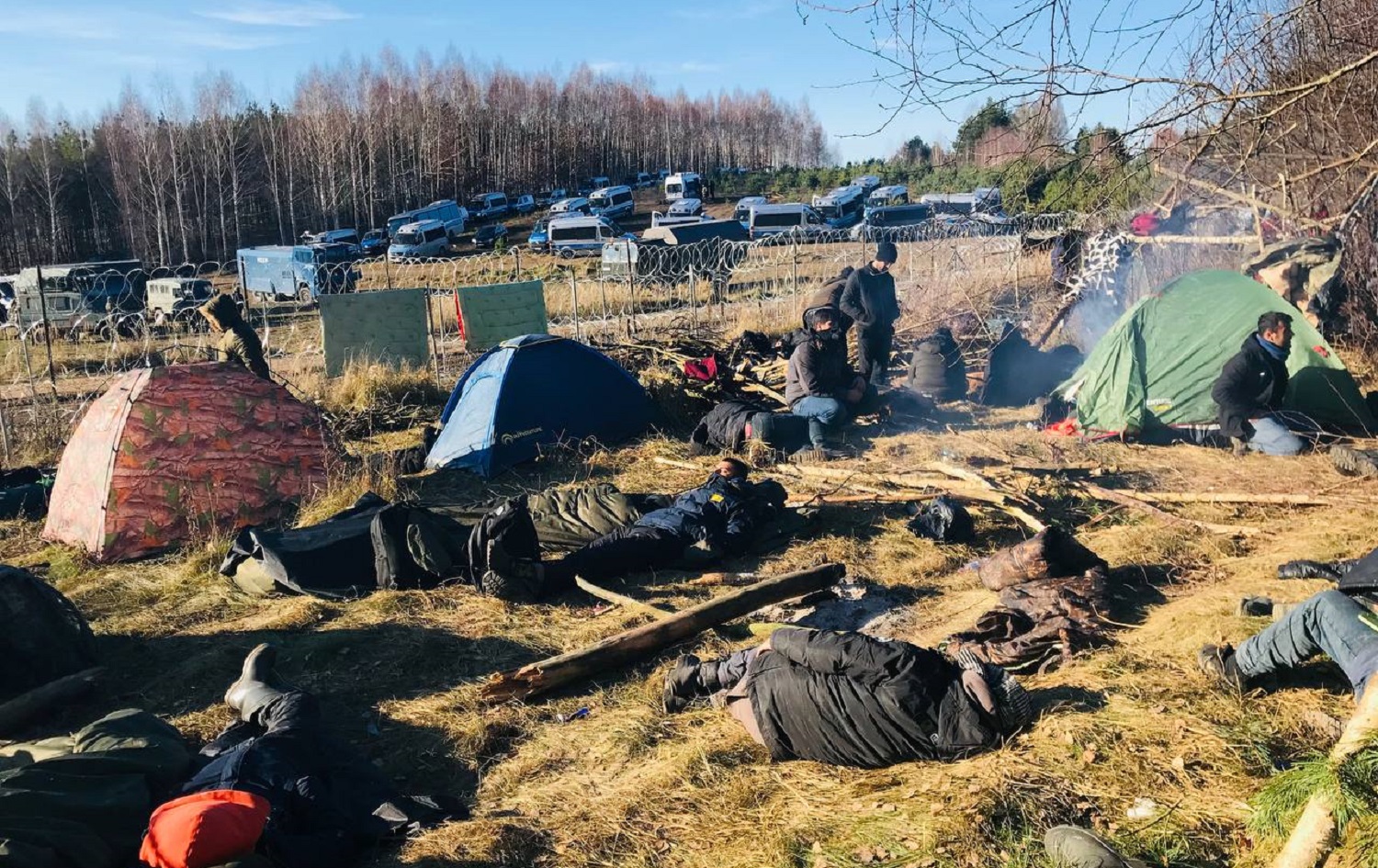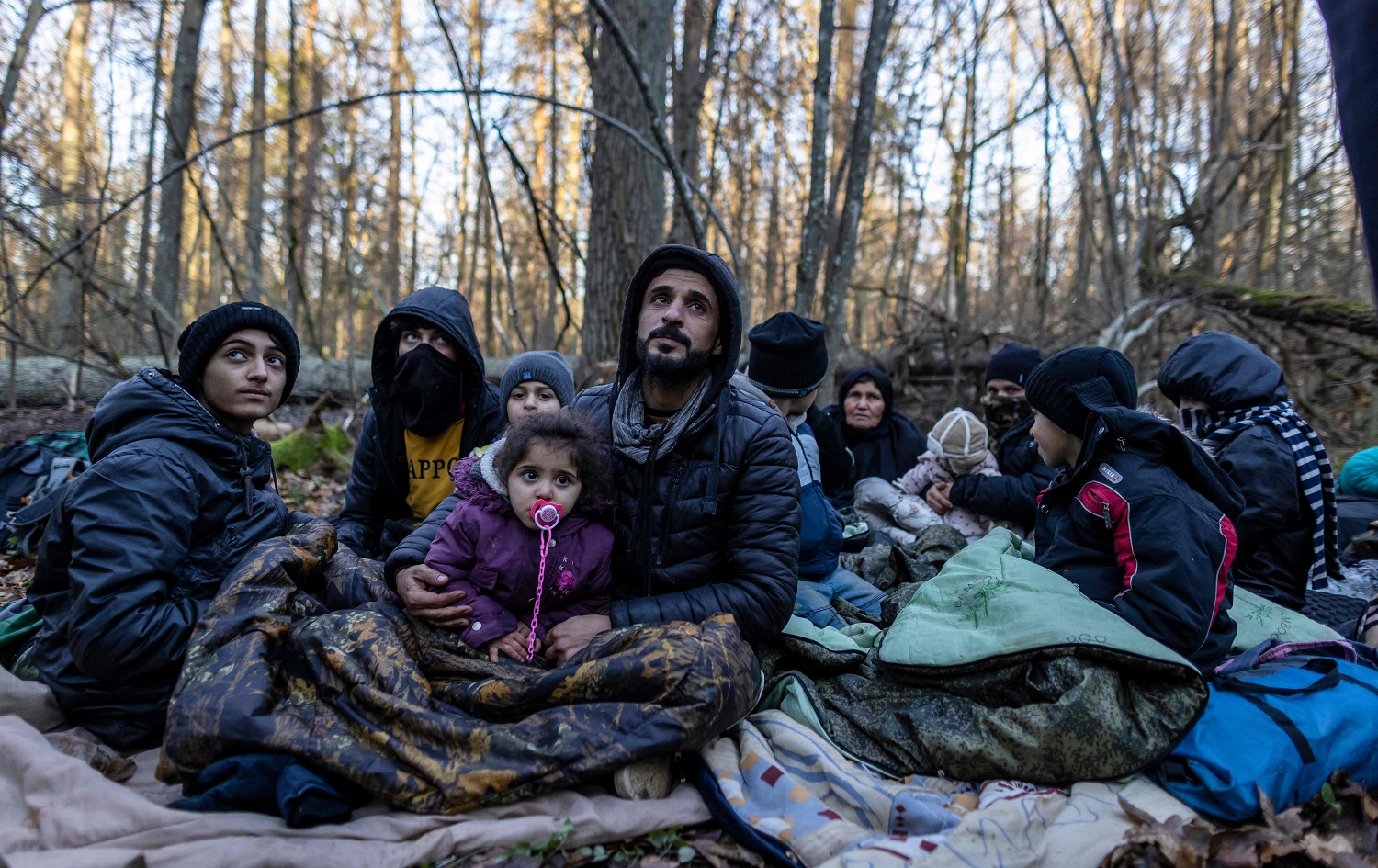
Migrants are camped out on the Polish-Belarus border on November 9, 2021. Photo: Aryan Zellmi
ERBIL, Kurdistan Region - A rain cloud arrived in the Belarus-Poland border sky on Monday night, hours after hundreds of migrants gathered in a forest, steps away from the frontier. Among them is a young Kurdish man who fled creeping despair and hopelessness in his hometown in the Kurdistan Region. Generations of Kurds have lived similar migration scenarios, but this time the youth are not fleeing war and violence.
Aryan Wali Zellmi, 25, took shelter under the tall trees as Polish guards monitored his movements through a razor-wire fence. He is among thousands of Iraqis, Kurds, Iranians, and Syrians on the border. He could be a step closer to building a new life.
The first son to his parents, Wali left behind a family of loved ones and an education that he put on hold due to financial reasons. In search of a steady job, his eyes landed on Europe where he made the tough decision of choosing an unknown fate over the reality lived in his hometown in the Hawraman mountains of southern Kurdistan Region.

A week ago, he left for Minsk, his second attempt to get to Europe. A month earlier he flew to Belarus but was denied entry because of a problem with his visa and sent home after three days sleeping in the airport. He has spent at least $5,000 on the trips.
On Sunday, Wali and other migrants gathered in a mass protest in front of Galleria Minsk, a shopping mall in the Belarusian capital, and planned to storm the Polish border in one large group the next day.
“It was there that we decided what to do and how to do it,” Wali told Rudaw English from the border on Tuesday, speaking over Telegram intermittently because of his poor internet connection.
Thousands of migrants, mostly from the Middle East, Iraq in particular, have tried to cross into European Union nations from Belarus since at least early summer. The EU has accused Belarus of orchestrating the influx of migrants to punish it for imposing sanctions against the country. Since October 2020, the EU has imposed progressively restrictive measures against Minsk that were adopted in response to concerns over 2020 presidential elections, and the intimidation and violent repression of peaceful protesters, opposition members, and journalists.
Belarus’ neighbours have fortified their borders against the migrants, leaving thousands desperate in a country they had thought would be an easy gateway to western Europe.
Dozens of families, children and elderly, spent Sunday night in a forest in Grodno city in western Belarus before their long journey the next day. The city is located a few kilometers away from the border with Poland.
“We stayed there for one night so we could get together with our friends who were outside of Minsk, those who had just come to Belarus, and those who were on the borders,” Wali explained.
Videos of migrants in Belarus walking to the Polish border circulated on social media in the early Monday hours. The footage showed Belarusian security guards escorting the people to a forest near the Polish village of Kuzinca where the cold air cut as sharp as a knife.

The Belarusian forces gave the migrants sharp tools to use in cutting the razor-wire fence and chopping down trees to light a campfire for warmth, according to Wali.
“It is clear that it [Belarus] has hands behind this and they want to use us to gain what they want from the European Union, but at the same time, that is a form of help for us,” he said.
“We have become victims of Poland and Belarus without a doubt.”
Stuck in a dire situation, the migrants are in a zone largely inaccessible to humanitarian aid and media. They are hungry and thirsty, and are asking for help.
Poland boosted its security upon the arrival of the migrants on Monday, setting out a line of border guards, Hummers, and heavy weapons. Polish police on Wednesday detained over 50 migrants who made it across the border, according to AFP. They are still looking for others.
Warsaw declared a state of emergency on the border and the parliament passed a law that grants border guards the power to push migrants back across the border. It’s part of an effort by Belarus’ neighbors to fortify their borders and stop the migration but could breach Warsaw’s commitments under international law.
Poland’s Deputy Foreign Minister Piotr Wawrzyk told Polish public radio on Monday that, "Belarus wants to cause a major incident, preferably with shots fired and casualties,” and accused the Belarusian government of planning a "major provocation" by pushing migrants across the border.
Wali said forces have fired shots into the air, but he has not seen any in the group injured by gunfire.
The migrants are facing “brutality of both sides - of Belarus and Polish police,” Kurdish analyst in the field of language and education and Wali’s uncle Momen Zellmi told Rudaw English on Tuesday.
“The tension between Belarus and Poland increased and we believe that these people are becoming the victims of that tension,” he added.

Most of the thousands of migrants on the border are believed to be Kurds from Iraq, like Wali. They have given up hope of building a life at home.
An estimated 193,443 people have left the Kurdistan Region and Iraq by irregular means since 2018, according to data from the Summit Foundation for Refugee and Displaced Affairs (Lutka).
Kurds who have made the treacherous journey to Belarus have lost faith in the institutions, health care, and education system in the Kurdistan Region, Osman Golpi, an activist who has led public protests in Sulaimani, told Rudaw English on Wednesday.
The Kurdistan Region, often called a safe haven within Iraq, is facing crises of its own - high unemployment, corruption, political instability, and an economic downturn during the coronavirus pandemic.
Lack of jobs is a primary reason cited for why thousands of Kurdish youth seek a life in Europe. Children and youth sit on decaying chairs in broken-down buildings that leave you freezing in winter and as hot as the sun in summer as they make their way through a public education system that fails to prepare students for the job market.
The main employer in the Kurdistan Region is the government, which has been unable to pay its civil servants on time or in full for years because of the war with the Islamic State (ISIS), low oil prices, and disputes between Erbil and Baghdad. In late July, Prime Minister Masrour Barzani announced the end of salary cuts.
For some migrants from northern Duhok, the ongoing conflict between Turkey and the Kurdistan Workers’ Party (PKK) has driven them off their farmlands and onto the migration trail. Turkey has carried out two intense campaigns against the PKK in the province since April. Several civilians have been killed and scores of villages emptied.

It is mainly youth from rural areas who are leaving, according to Mera Jasm Bakr, a non-resident fellow at the German Konrad Adenauer Foundation.
“After the fall of the Ba’ath regime in 2003, the infrastructure of the rural areas including its districts, sub-districts and villages was damaged, it was completely devastated. At that time, that area had a great employment gap, a lot of its people were unemployed. After the formation of the Iraqi government, a lot of money would be delivered to Kurdistan, around a billion dollars monthly,” he explained.
The money went into the hands of the two ruling parties of the Kurdistan Region - the Kurdistan Democratic Party (KDP) and the Patriotic Union of Kurdistan (PUK). “Instead of rehabilitating these areas and building an economic infrastructure, they massively employed people in the public sector… and most notably in the security sector,” said Bakr.
This practice began to slow when the economic problems began in 2013 and stopped in 2017, he said, when the government did not have the money to hire people.
These under-developed areas are now driving the migration. “One of the main reasons in the rural areas is unemployment. There are no jobs there, and the reason is that they lack infrastructure especially economic infrastructure,” said Bakr.
Another reason for migration could be mimicry but “in today’s case, it is very little. These people are hopeless,” according to Golpi.
“I think the government will take action this time especially after the low turnout in the Iraqi election and the migration crisis,” Golpi added. “If it doesn’t, then that indicates the absence of intellect.”
Kurdistan Regional Government (KRG) ministers met on Wednesday afternoon to discuss the migration crisis. Spokesperson Jotiar Adil afterwards told media the crisis was “political” and being used against the government.
The KRG will take the necessary measures in this matter, he added without giving a clear plan.








Comments
Rudaw moderates all comments submitted on our website. We welcome comments which are relevant to the article and encourage further discussion about the issues that matter to you. We also welcome constructive criticism about Rudaw.
To be approved for publication, however, your comments must meet our community guidelines.
We will not tolerate the following: profanity, threats, personal attacks, vulgarity, abuse (such as sexism, racism, homophobia or xenophobia), or commercial or personal promotion.
Comments that do not meet our guidelines will be rejected. Comments are not edited – they are either approved or rejected.
Post a comment